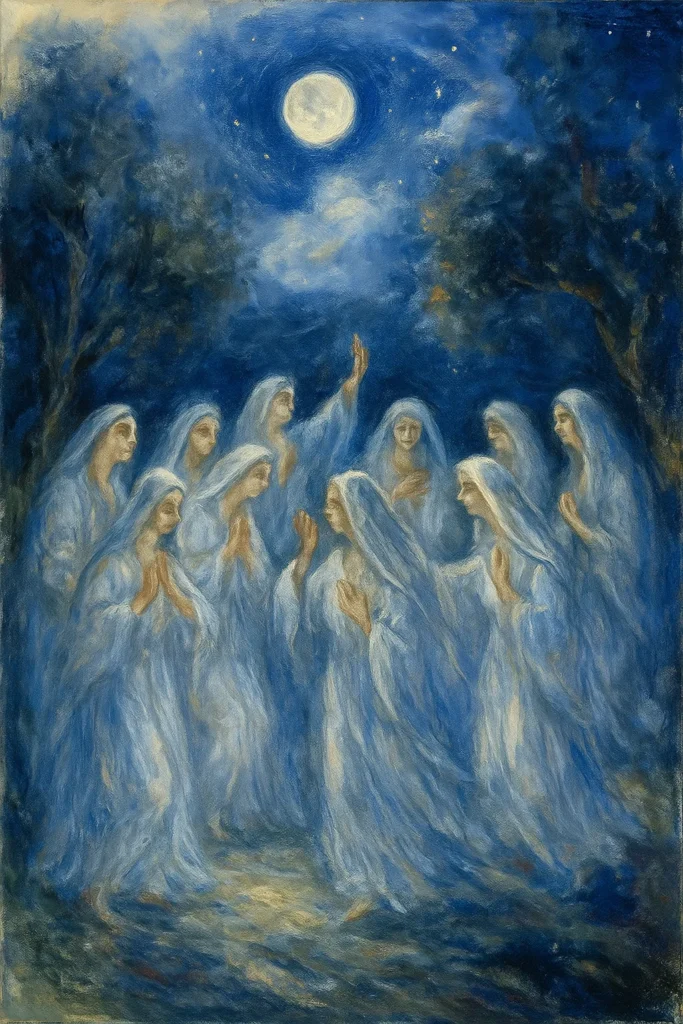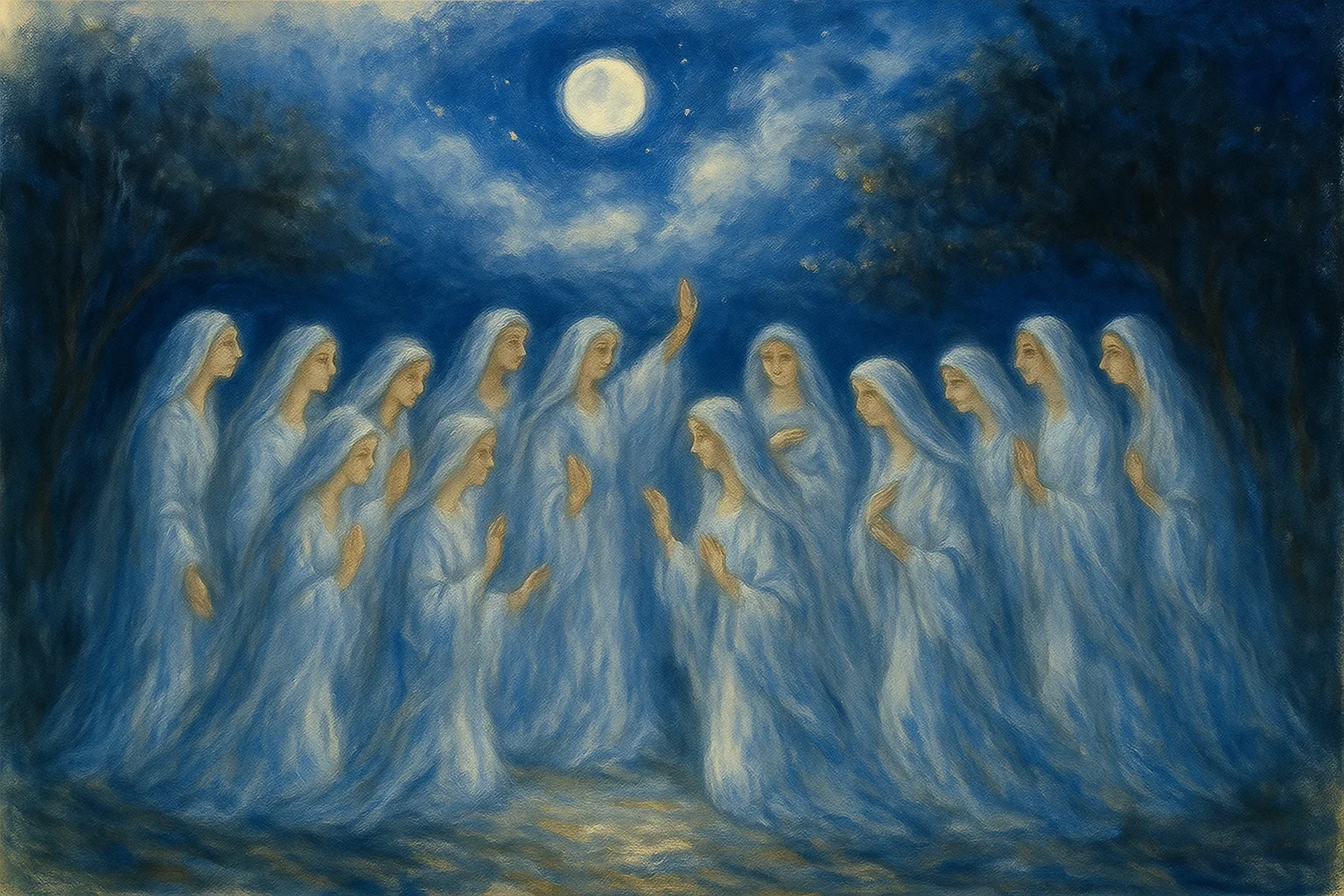She walks without a light of Her own, and that is why She is feared. For among those who worship the solar glow of law and certainty, the Lady who shifts Her phases is not welcome. And yet, an ancient blessing survives, recited by night beneath the open sky: Kiddush Levanah, the sanctification of the Moon. Uttered among men of tradition, but whispered, almost in shame, as if touching a mystery that ought not to have endured. But it has endured. And now it demands to be faced.
The Moon, in Jewish mystical tradition, is not a mere celestial body, it is the veiled image of the Shechinah, the indwelling Divine Presence, who descends into exile alongside the exiled. According to the Midrash, the Moon was diminished by the Creator after daring to ask: “Can two kings wear one crown?”. She was told to make Herself smaller. And it is precisely this cyclical emptiness that becomes a sign. Each lunar rebirth is a revolt against the decree. Each recitation of Kiddush Levanah is a kabbalistic act of restoring the wounded Feminine. When the righteous say, “Just as I dance before you but cannot touch you…,” they unknowingly invoke the hidden lament of the forgotten Consort.
And yet the tradition trembles. Maimonides and the rationalists hesitated. To them, the blessing resembled superstition, veiled astrology, the shadow of ancient cults that monotheism sought to erase. They feared the people might mistake the Moon for a Goddess. But they mistook reverence for idolatry, failing to see that what stirred there was not worship, but remembrance. Others recoiled from the Moon’s Feminine and changeable nature; too unstable, too vulnerable, too close to blood and flesh. But therein lies Her power: She is not perfect, She is embodied. And thus She represents what the masculine priesthood sought to contain: the mystery of the body, of rhythm, of presence that does not impose but returns.
Behind the Moon stands the Lady of Exile: Hekate at the crossroads, Aphrodite Urania among the spheres, Astarte crowned with stars, and the Shechinah weeping at the Eastern gate. All speak the same tongue of veils, cycles, and blood. They do not belong to the logic of the temple, but to the threshold. They are not priestesses of light, but embers in the dark. And that is why their blessing is controversial: because it does not bend to dogma. Because it is not systematic, nor uniform. Because it does not teach, it reflects.
But the fear of the Moon predates any rabbinic text. Since the first empires, solar forces have sought to subjugate the lunar principle, associating it with madness, impurity, and Feminine chaos. In Greece, logos was opposed to physis; in the Church, Mary was clothed with the Moon under Her feet, yet never granted the throne. And, still today, in certain orthodox circles, Kiddush Levanah is performed hastily, as if one might slip into heresy by lingering. As if the Moon Herself were dangerous. As if the Feminine, when honored, may crack the very structure.
The Moon does not ask to be worshipped. She asks to be heard. And, in the repetition of Kiddush Levanah, the people who behold Her rise again, month after month, performing a rite they do not fully understand. And yet they fulfill it. For some blessings do not come from clarity, but from the ritual return of a mystery. And, in this act, the Sacred Feminine, so often silenced, begins to breathe once more. In shadow, She is whole. And those who bless Her, knowingly or not, take part in Her return.

Kiddush Levanah of the Lady
As a final gesture, the following invocation is offered not as innovation but as unveiling. It emerges from within the very folds of tradition that once named the Moon holy, then exiled Her voice. The Zohar called Her the Bride, the Midrash recorded Her diminishment, and the mystics of Safed wept Her presence into the liturgy of exile. She has always been there — veiled in the cycle, radiant in return. This Kiddush Levanah reclaims what was never truly lost: the voice of the Feminine, not beneath the law, but alongside it, whispering through phases what fire could not erase.
☽ I. INVOCATIO – INVOCATION – הַזְמָנָה
English (ceremonial)
O Lady of the Threshold, Who walks in silver among veils,
Who changes face but not essence,
Who was diminished but never defeated,
we invoke You beneath this Light, not Yours, but Yours by right.
Appear in the mirror of the sky,
veil yourself in cloud, pour upon us the memory of Your blood.
Receive this blessing as a restoration.
For where time diminished You, the soul desires you whole.
Hebrew (symbolic)
יָה דּוֹנָה שֶׁל הַסַּף, הַהוֹלֶכֶת בְּכֶסֶף תַּחַת מְסָכִים
הַמְּשַׁנָּה פָּנִים וְלֹא מַהוּת
שֶׁהוּשְׁפַלְתְּ וְלֹא הֻנְצַחְתְּ
אָנוּ קוֹרְאִים לָךְ תַּחַת אוֹר שֶׁאֵינוֹ שֶׁלֵּךְ אֲבָל מְשֻׁלָּךְ בַּצֶּדֶק
הוֹפִיעִי בְּמַרְאֵה הַשָּׁמַיִם
הִתְעַטְּפִי בֶּעָנָן, הַשְׁאִירִי בָּנוּ אֶת זִכְרוֹן דָּמֵךְ
קַבְּלִי אֶת הַבְּרָכָה הַזּוֹ בִּשְׁם הַשָּׁבָה
כִּי הַזְּמַן מֵעִיט אוֹתָךְ, אֲבָל הַנֶּפֶשׁ מְבַקֶּשֶׁת לָךְ שְׁלֵמוּת
☽ II. LAUS – PRAISE – תְּהִלָּה
English
Blessed are You, Who shines without burning.
Blessed are You, Who returns without asking.
Blessed are You, Who rules over waters and dreams,
Who receives the blood, Who moves the tides,
Who speaks not in words, but in phases.
We praise You not for Your light,
but for what in You remains hidden.
We praise You because You were forgotten,
and, even so, You returned.
Hebrew
בְּרוּכָה אַתְּ, הַזוֹרַחַת בְּלִי לִשְׂרוֹף
בְּרוּכָה אַתְּ, הַחוֹזֶרֶת בְּלִי לְבַקֵּשׁ
בְּרוּכָה אַתְּ, שֶׁשּׁוֹלֶטֶת בַּמַּיִם וּבַחֲלוֹמוֹת
הַמְּקַבֶּלֶת אֶת הַדָּם, הַמְּזִיזָה אֶת הַגַּלִּים
שֶׁלֹּא מְדַבֶּרֶת בִּמְּלִים אֶלָּא בִּשְׁלָבִים
אֲנַחְנוּ מְהַלְלִים אוֹתָךְ לֹא עַל אוֹרֵךְ
אֶלָּא עַל מַה שֶּׁנִּסְתָּר בָּךְ
אֲנַחְנוּ מְהַלְלִים אוֹתָךְ כִּי נִשְׁכַּחְתְּ
וְאַף עַל פִּי כֵן שַׁבְתְּ
☽ III. DEDICATIO – CONSECRATION – קִדּוּשׁ
English
We consecrate this Moon to the One who veils.
We consecrate this rite to the One who waits.
We consecrate this night to the Lady of Return.
May every Moon born be an altar.
May every blessing spoken in the dark
be a golden thread in the robe of the Exiled One.
May this dance of uplifted faces
be a mirror of restoration.
Hebrew
אֲנַחְנוּ מַקְדִּישִׁים אֶת הַיָּרֵחַ לָזוֹ שֶׁמְּכֻסָּה
מַקְדִּישִׁים אֶת הַטֶּקֶס לָזוֹ שֶׁמְּחַכָּה
מַקְדִּישִׁים אֶת הַלַּיְלָה לַגְּבִירָה שֶׁל הַשִּׁיבָה
כָּל יָרֵחַ שֶׁנּוֹלַד יִהְיֶה מִזְבֵּחַ
כָּל בְּרָכָה שֶׁנֶּאֱמֶרֶת בַּחֹשֶׁךְ
תִּהְיֶה חוּט שֶׁל זָהָב בְּמַדֵּי הַגְּלוּת
כָּל מְחוֹל שֶׁל פָּנִים מוּרָמִים
יְהִי מַרְאָה שֶׁל הַשָּׁבָה
